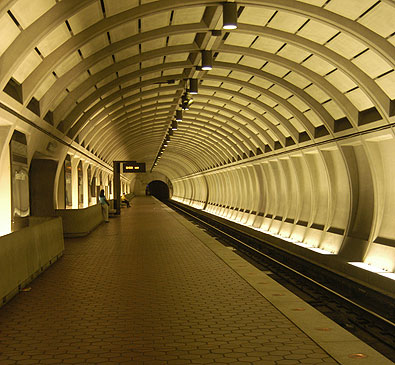A powwow between Senate Majority Leader Harry Reid, President Obama, and House Speaker John Boehner last night failed to yield a compromise that would put a budget in place before the government shuts down at midnight tonight. The failure of yet another attempt to negotiate makes a government shutdown all but inevitable.

Just a month ago, AASHTO sounded the warning that the transportation sector could lose up to $100 million a day in case of a shutdown. However, Congress's extension of SAFETEA-LU through the end of the fiscal year (September 30) has put their minds at ease. Now, AASHTO spokesperson Tony Dorsey says spending for federal highway programs will continue unabated, despite a shutdown. "At this point," Dorsey said, "we’re not anticipating any issues." Still, he said, they're hoping that "should there be a shutdown, it will be a very, very short one."
But that's not the whole story. According to a detailed DOT shutdown plan, the vast majority of the Federal Transit Administration would shut down, keeping only 54 out of 575 positions working. Already-awarded stimulus grants would continue to receive oversight and the Lower Manhattan Recovery Office would continue to function. The $270 million that the FTA normally remits to transit agencies every week would cease.
Jeff Rosenberg, government affairs director for the Amalgamated Transit Union, says the SAFETEA-LU extension only continues government's authority to pay for transportation programs. But "if the FTA isn’t authorized to open the door," he says, those payments will cease. That could be especially damaging for smaller metros that receive operating assistance, not just capital funds, from the feds. However, he's hopeful that a potential shutdown would only last a couple of days and would just be "a blip on the screen."
What else can you expect to happen if the government does shut down as of midnight tonight?
- At least 800,000 federal employees would be furloughed immediately. That would cause a massive drop in transit ridership, especially here in D.C., where Metro is predicting a five to 20 percent drop in case of a shutdown. Michael Perkins of Greater Greater Washington estimates that this would result in a loss for Metro of a quarter million dollars a day.
- Amtrak’s federal subsidies – up in the air for months now anyway as Congress debates whether to eliminate them, reduce them, or maintain them – will stop. However, Amtrak CEO Joe Boardman recently assured employees that the rail operator can keep going on ticket revenue alone in the short term.
- The Federal Highway Administration will stay open, with no positions furloughed, according to the DOT shutdown plan. The FHWA is funded with contract authority and has enough funds available to operate in that way for about a month.
- More than half of the Federal Railroad Administration’s workers would be furloughed.
- The Federal Motor Carrier Safety Administration will keep operating with a full staff.
- As a result of the colonial arrangement by which Congress controls D.C.’s city budget, some core D.C. city functions would grind to a halt. A new campaign to “take your trash to Boehner’s house” in case a shutdown stops garbage collection already has nearly 5,600 Facebook fans. (The city would resume trash collection after one week, when uncollected garbage constitutes “a danger to public health.”)
- D.C. Street sweeping, taxicab regulation, most road repairs, the DMV, and public libraries could also be suspended.
- D.C.’s metro system would keep running, and would even keep a rush hour schedule, but might reduce the number of cars.
- Circulator buses and Capital Bikeshare would also keep running.
- The Federal Housing Administration would stop guaranteeing new home loans. FHA loans account for 30% of the housing market.
- Most of the National Highway Traffic Safety Administration, which issues auto recalls and makes grants to states for safety campaigns, would close, with about 65 percent of its employees furloughed.
- The air traffic control system would keep functioning.
- Long project delivery times and construction delays are already a major concern of Congress, and the House Transportation Committee has prioritized eliminating delays. Well, so much for that – the EPA would cease conducting environmental impact reviews in case of a shutdown, slowing the approval for construction projects.
We're continuing to monitor developments, but at this point, we're bracing for a shutdown. A few hours ago, Reid took to the Senate floor to declare that the “one issue remaining last night” was the GOP rider defunding women’s health services. Boehner’s office maintains that the issue is, as always, spending cuts. Both sides are hoping the public will blame the other party in case of a shutdown. Reid hopes people will be as “appalled,” “frustrated,” and “personally offended” as he is if the GOP is so dead-set against cancer screenings for women that they’ll shut down the government over it. The Republicans hope to portray the Democrats as being so unwilling to budge on just a few billion dollars that they’d even let U.S. troops overseas go without pay.
Whoever’s to blame, it looks like the rest of us may be forced to go without some government services for a while. The longest government shutdown in modern history – the Newt Gingrich episode – lasted 21 days, but there’s no telling whether this one will break that record.
Remember, even once Congress is able to come to some kind of agreement over the FY2011 budget – whenever that may be – there’s still the FY2012 budget to worry about.





